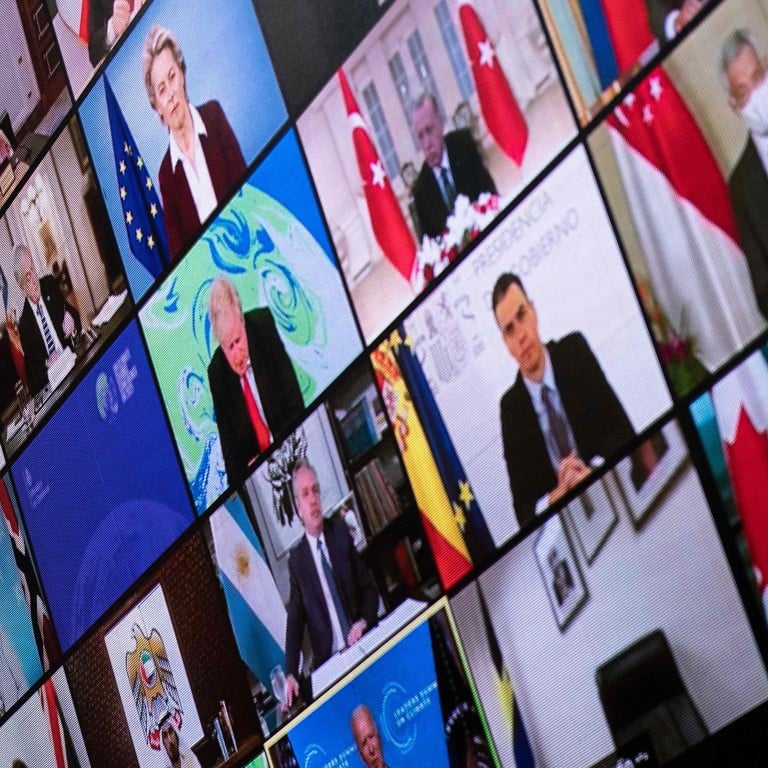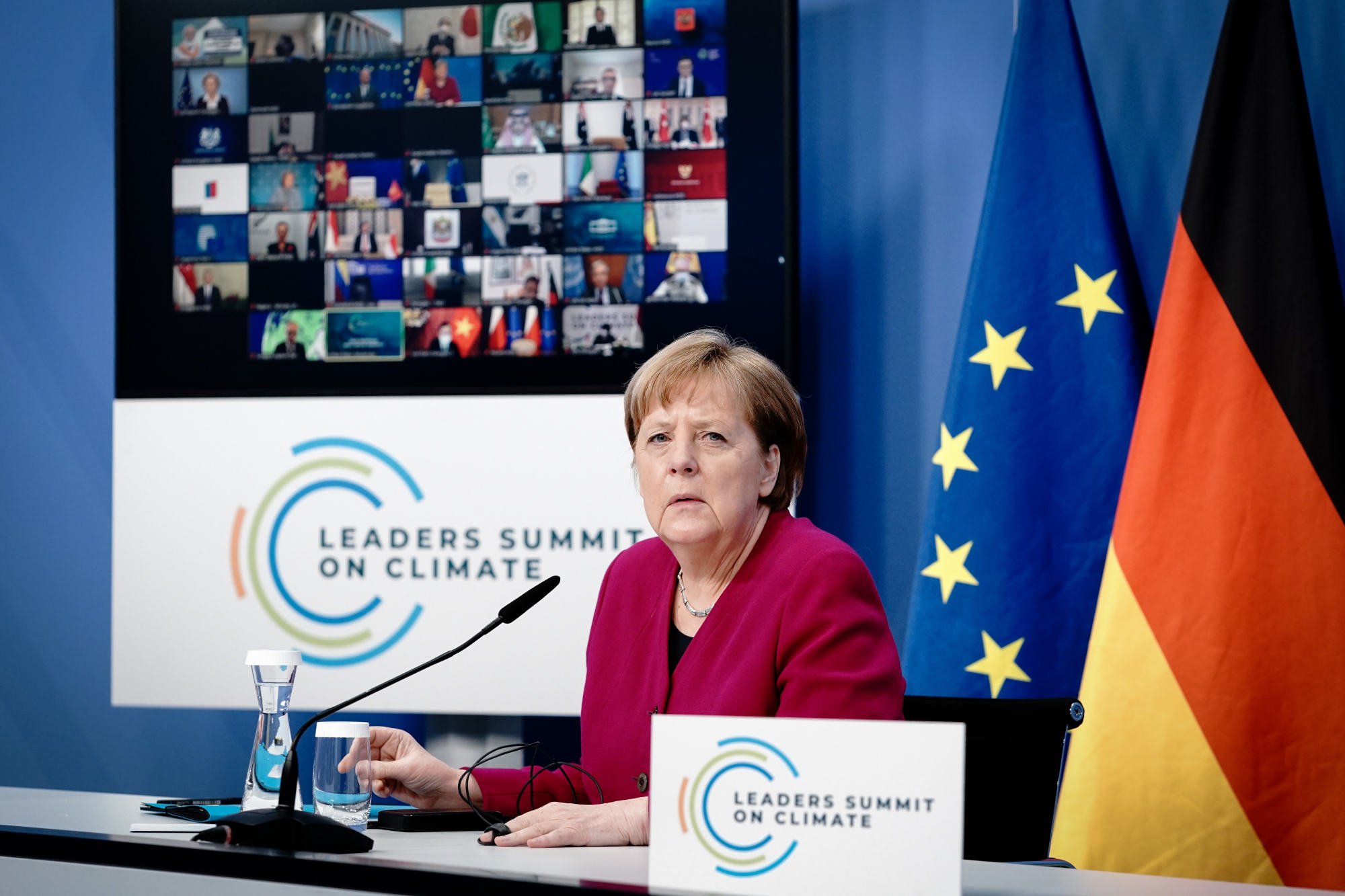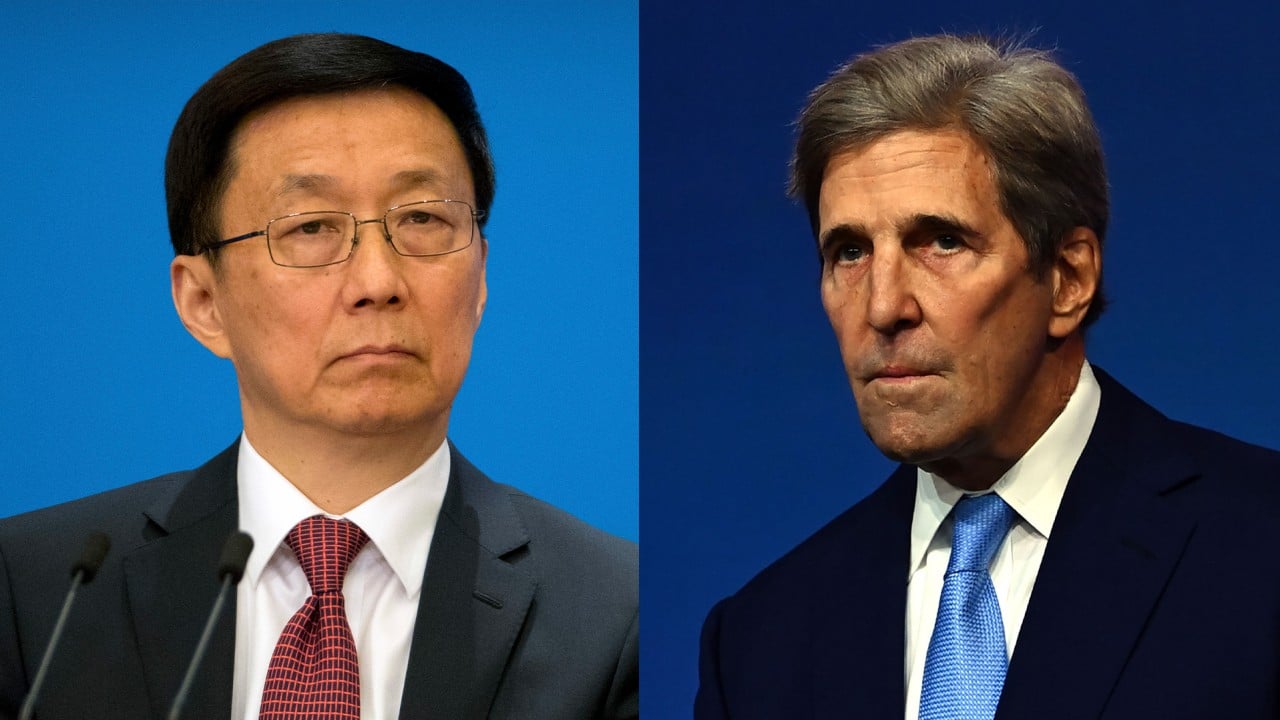
Global climate summit: US sets emissions target for 2030; China offers no new commitments
- Biden pledges that the US would cut greenhouse gas emissions in half from 2005 levels by 2030
- India and China do not offer new commitments, but Xi Jinping pledges to ‘strictly control’ coal-fired power plants
Leaders from around the world called on Thursday for cooperation to reduce greenhouse gases towards an eventual goal of net-zero carbon emissions in a bid to tamp down a rapidly warming planet.
And European leaders called for greater use of innovative financing and disruptive green technologies as the global economy recovers.

“This is a moment of peril but also a moment of extraordinary possibilities,” he said in a short speech to world leaders. “We really have no choice. We have to get this done.”
Biden’s commitment compares with a pledge during the Barack Obama administration to cut US greenhouse gas emissions by 26 to 28 per cent below 2005 levels by 2025.
Biden on Wednesday also urged countries to draw on their political capital to come up with meaningful emission-reduction commitments. But the payoff, he added, will be new jobs, industries and technologies.
China excludes fossil fuel projects from green bonds
Speaking from Beijing, Xi cited the importance of sound environmental policies for development, social equity and justice.
The Chinese president also pledged to “strictly control” coal-fired power plants in China’s current five-year plan and “phase it down” over the following five years.

European leaders, meanwhile, offered some of the day’s more forceful and detailed commitments as German Chancellor Angela Merkel called on nations to view the post-pandemic economic recovery as an opportunity to invest in renewables and reshape their economies.
Macron followed with calls – echoed by Treasury Secretary Janet Yellen – to recognise the crucial role of green financing in paying for and providing incentives for altered behaviour.
“If we don’t set a price for carbon, there will be no transition,” he said, adding: “Let’s move more quickly on our cooperation on innovation and disruptive technologies, which will enable us to rise to the challenge, and drive down our costs.”
Biden’s climate pledge is less ambitious than the EU’s target and falls below a coming UK goal for a 78 per cent reduction by 2035 from 1990 levels.
China’s climate change journey
Japan and Canada each offered new pledges while major emitters India – Indian Prime Minister Narendra Modi spoke after Xi – and China did not offer new commitments.
Li Shuo, senior adviser for Greenpeace in Beijing, described Xi’s latest pledge as “underwhelming”.
“More ambitious actions are needed,” Li said. “The domestic conditions for faster emission reduction [are] becoming mature. It is in China’s self interest to announce and implement further plans.”
But in a press conference after the summit, Chinese officials defended Xi’s lack of concrete new pledges saying that climate change should not be used as a “geopolitical tool”.

“We are at a different development stage than the US and Europe,” said Xie Zhenhua, China’s special envoy for climate change, adding that China’s progress toward carbon neutrality was faster than US and European plans despite “immense difficulties” in restructuring its economy.
The 40 heads of state taking part in the virtual conference represented countries that account for over 80 per cent of the global economy.
The summit’s first hours also featured some of the world’s poorer nations already forced to weather the harsh realities of climate change.
US senators propose more programmes to help competition with China
Leaders from countries like Bhutan and the Marshall Islands warned in stark, detailed terms how a warming climate has already begun to upend life with floods, fires and droughts.
“Over half of Africa’s countries are predicted to experience climate-driven conflict,” said Gabon President Ali Bongo Ondimba.
China and the US, the world’s two biggest carbon polluters, agreed last week to cooperate to curb climate change with “urgency” after US special envoy for climate John Kerry met his Chinese counterpart Xie in Shanghai.
“There are many issues on which we don’t all see eye to eye,” US Secretary of State Antony Blinken said, referring to the global community. “This is not one of them.”
China is the world’s largest carbon emitter, followed by the United States, and together the two powers pump out nearly half of the fossil fuel fumes that are warming the planet’s atmosphere.
European leaders welcomed Washington’s return to a climate leadership role.
“I’m delighted to see that the United States is back,” said Merkel. “There can no doubt about the world needing your contribution if we really want to fulfil our ambitions goals.”
Broadcasters must disclose content sponsored by China or Russia, rules US FCC
But the US political flip-flop also has made leaders wary that a new US president in 2024 could reverse policy again. In response, the Biden administration has argued that market forces will soon give energy efficiency and cleaner fuels irreversible momentum.
Thursday’s speeches were replete with sweeping language and lofty goals. But the real test will come when various nations commit to – or balk at – detailed targets that impinge on vested interests and upend economies.
The United Nations is expected to hold talks in Glasgow, Scotland in November where some 200 governments will be asked to spell out what each is willing to do.

Beyond speeches, this week’s two-day gathering includes sessions on climate financing, innovation, and opportunities for economic growth.
While international summits generally include bilateral meetings on the periphery, this summit will not, US officials said speaking on background, because the “technical challenge” posed by a virtual forum.
EU agrees to go carbon-neutral by 2050 ahead of Biden climate summit
Last year, Beijing announced that it aimed to reach peak carbon dioxide emissions by 2030 and net zero emissions by 2060, targets Xi repeated on Thursday. In March, the Communist Party pledged to reduce carbon emissions per unit of economic output by 18 per cent in its next five-year plan, matching its goal over the previous five years.
US officials have expressed hope that China – which continues to build and finance coal-fired power plants – can strengthen its environmental targets, but China has pushed back, citing its status as a developing country.
Additional reporting by Jacob Fromer, Owen Churchill, Zhen Liu and Catherine Wong


